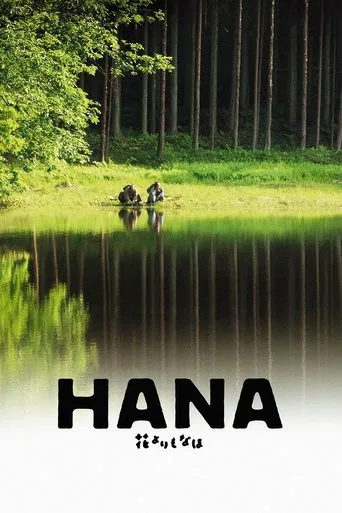

This film was produced by Shochiku, a studio that I'm told is renowned for it's middle-of-the-road part-comedy/part-pathos films. Hana fits squarely in that territory and is Kore-eda's most commercial film to date.Set in the slums of 1702 Edo (now Tokyo), the cinematography and attention to period detail were excellent. The story itself is fairly lame. A young samurai, incompetent with a sword seeks revenge for his father's death, but finds himself unable to carry out the act.There's no doubting the competence of the director and the film's visuals are a joy to behold. It's not something that particularly engages me, but is the sort of film I would love to take my six year old son to. The blend of humour and almost slapstick action would certainly be enjoyed by him. Mind you, this is not really a children's film, even though it has the appeal of a Japanese version of a Disney film. Many adults would enjoy it, but it's not my thing.
... View MoreIn 'Hana' Koreeda has turned from modern times to make another samurai-going-out-of-style movie, set in 1701 when "sword fighting has flown out of fashion with the wind." The film focuses on the cute Soza, played by boy-band singer Junichi Okada, who's supposed to avenge the death of his samurai father (embarrassingly, in a fight over a go game rather than any battle), but would rather play go himself, soak in a hot tub, or teach neighborhood kids writing than practice his swordplay. Hana questions the very validity of revenge and war but unfortunately does so with an inept fighter and even a coward as a hero. Why this isn't a good way of presenting alternatives to warlike philosophy is obvious: a hero is needed who can say "I can do it but I choose not to," rather than one who must say, "I can't, so I better not." Despite the film's considerable charm in presenting a variety of colorful characters and incidents -- abetted by excellent acting, a realistic period tenement setting, and fresh-sounding western renaissance music -- its main character becomes an embarrassment and a disappointment rather than a revelation. Unfortunately the young star's appealing sweetness seems a mockery. As Mark Shilling of Japan Times has commented, Okada is "too handsome and cool to be a sympathetic coward. Too bad Bill Murray isn't 20 years younger -- and Japanese." Moreover (as Shilling also says) 'Hana's' lively incidents are rather meandering, don't interact very well, and don't add up to climactic moments: the story line "lacks anything major." The natural impulse is to want the climax of a real revenge, the one Sozo is supposed to enact. Defeating such conventional expectations, the film feels longer than it is.It may be that Koreeda, whose films have created a unique mood, means for 'Hana' to make us uncomfortable, and the colorful characters and rude toilet jokes are an intentional effort to put us off our guard. Certainly when the moment first comes when Soza is beaten up by a local punk in pink, Sodekichi (Ryo Kase), it's horrifying and demoralizing because Soza up to then has been not only immensely simpatico, but a guy with a worthwhile function in the tenement house (nagaya) village -- which Koreeda has departed from film tradition in making realistically rickety. Soza says he's in the shabby place because (as introductory titles have told us) samurais are frequently undercover in such locations at the moment. When he learns his revenge-object, Kanazawa Jubei, is living nearby, it turns out one of his informants and café-pals knew it all along and the latter advises him to say nothing. "This samurai revenge thing is out of style," he adds. Besides, "with your skills" (i.e., the lack of them), "you're doomed." 'Hana' makes this sort of point too bluntly and repetitiously.The setting, which compares (as Shilling notes) to that of Kurosawa's memorable flop 'Do-des-ka-den,' is a lively but pathetic community where people live selling scraps -- and their own excrement, sold for fertilizer to a landowner, is worth more than the fruit of their labors. It's a world where indignity is a constant, in which Soza's humiliations seem almost normal.The interest of 'Hana,' despite its not being Koreeda at his best, is that it reflects contemporary Japanese demoralization -- a deep sense of the loss of traditional values as well as an equally strong sense of personal uncertainty in the old areas of machismo that once were strong. And it does this in a deceptively traditional-looking framework that shows how seductive and unavoidable Japanese tradition still remains. In that way, the director has been able to manufacture the same troubling unease that made his more powerful 'Nobody Knows' so riveting and disturbing. This still feels like a distinct misstep for the filmmaker -- but he has seemed capable of doing something completely different almost every time -- and no doubt what comes next will be a surprise, perhaps a more exciting one.Shown as part of the San Francisco International Film Festival 2007.
... View MoreI think the first reviewer misses the point of Kore-Eda's work. He has an almost documentarian's way of showing human behavior. It's decidedly not theatrical. His characters are flawed, real people. Soza-sensei's abhorrence of violence is not undercut by his fear of being sliced up. He discovers the strength to be a real human being amid what he comes to recognize as counterproductive posturing.The 47 Ronin subplot is not a distraction. It's a mirror of Soza's choosing life over revenge. Susumu Terajima hits just the right note as the surviving Ronin. If you don't know Japanese history and myth-making, it might seem like a distraction, but it is the point of the whole story, that a slavish devotion to the ideals of Bushido is in conflict with living an authentically human life.Besides, Rie Miyazawa is a total hoot in the play within a play. It is a pleasant surprise that Kore-Eda can do comedy and still keep it real. I was beginning to think that he was only good at grimness, but I was reminded of the small comic touches in "Nobody Knows" and "Afterlife." I can't remember if there was anything funny in "Mabarosi." I just remember how depressing it was.
... View MoreDirector of "Dare mo shiranai" (2004) (which brought 14-year-old Yagira Yuya his Cannes Best Actor award) tackles his first samurai movie "Hana yori mo naho" the literal translation of which is something like "martial artist of flower". Following this title, the Hippie's "flower power" in the 60's is not such a far-fetched thought association. This "samurai movie" refuses to give traditional samurai movie fans even one single sword combat scene. Like "7 samurai", "Twilight samurai" and "Hidden sword and devil's claw" and "Shinobi", Hana depicts the dying world of samurai. Unlike any of these, however, it takes the lighter side, to the point of farce and parodies. The simply main plot depicts how a young samurai called Suza (Odaka Junichi), financed by family fortune, come to a poverty-stricken village in search of an "adversary" (that's what the local sub-title says) to revenge his father's death. While it does not go to anti-hero proportions, it soon becomes evident that Suza's interest is not in traditional samurai values of bushido and revenge, but in trying to help the local kids (and adults) to become literate. Like "7 samurai", "Twilight samurai" and "Hidden sword and devil's claw" and "Shinobi", Hana depicts the dying world of samurai. Unlike any of these, however, it takes the lighter side.This samurai-turned-teacher also develops an honourable attachment to a beautiful widow (Miyazawa Rie) and her bright 8-year-old son, becoming something akin to the surrogate head of the family. When the "adversary" (Asano Tadanobu) appears on the scene, with his own family that include a 7-year-old son, the score is not settled by the expected duel-to-death, but unexpectedly through the friendship of the two little boys.But this is not all, far from it. True to the Kurosawa tradition, to which great tributes have obviously been paid, this movie portrays an ensemble of common, simple, "little" people, at least a dozen of them, probably more. Simply but honestly told, some of these stories are familiar such as a parted young couple ended up with the girl marrying a rich man, or two lonely old folks finding love and comfort with each other. More adventurous is a rather daring spoof of the much revered legend of the "47 ronins". You'll find even a trace of Shakespeare (Midsummer night's dream) in the rehearsal of a play in the movie. However, without the usual commercial elements, this movie may bore uninformed audience seeking a thrill, despite the fact that it is crisply shot, contains some funny moments and sustains by lively music that sounds almost Scottish. Okada Junichi, not generally known even to regular followers of the Japanese movie scene, does justice to the character of the gentle, troubled young samurai. Miyazawa Rie, in her beguiling beauty that is all at once both fragile and strong, creates a different but equally memorable character as the abandoned wife in "Twilight samurai". Asano Tadanobu's fans may be disappointed because what he has in fact amount to almost cameo role (although not an unimportant one). In conclusion I can do no better that quoting the introductory literature in the Toronto International File Festival: "Vivacious and strewn with humour, HANA speaks the language of today and conveys a message of hope and serenity that crosses the boundaries of its temporal setting. Without imposing heavy moral judgments, it asserts a clear ethic and renders a colourful portrait of human weaknesses and strengths - its rich narrative texture is variegated as the precious fabric of a regal kimono."
... View More